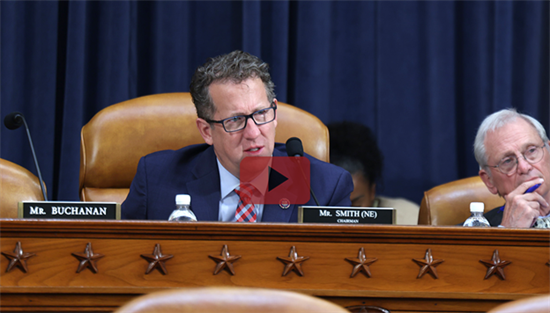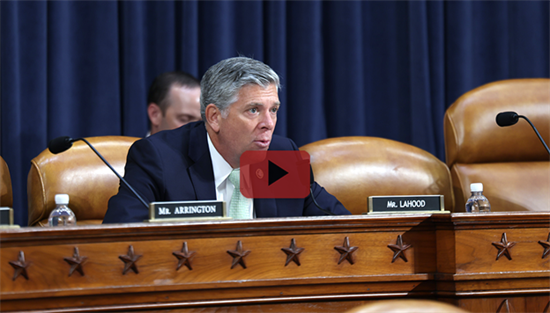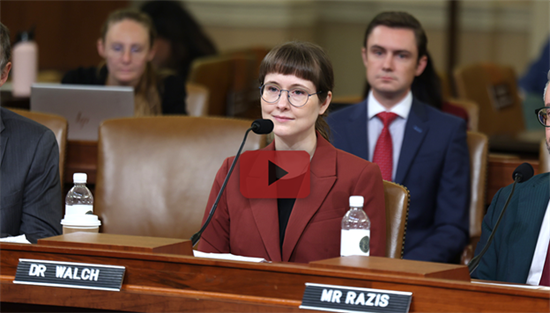Abandoning enforcement and accountability in digital trade, as the Biden-Harris Administration has done, has led to a surrender of America’s innovative and technological leadership, Republican and Democrat members warned at a Ways and Means Trade Subcommittee hearing on enforcing digital trade rules. In 2023, the United States Trade Representative walked away from long-held digital trade rules advanced by both Republican and Democrat Administrations. Witnesses shared how this lack of deterrence has emboldened nations around the world, including China as well as some of our closest allies, to enact a broad range of regulations and taxes that discriminate against American technology companies and harm U.S. jobs. These policies threaten America’s technology and innovation sector, a major engine of economic growth, and aid the Chinese Communist Party in its attempt to spread its model of making censorship and oppression the hallmarks of the Internet. In light of the destructive nature of these policies, members repeatedly called for a change in direction from the current Biden-Harris trade agenda to instead support and fight for a robust, proven digital trade agenda that advances American interests.
Opening the door to China
Developing nations have become the new battleground for digital trade engagement. In the wake of the Biden-Harris Administration’s decision last October to no longer support core, bipartisan digital trade rules at the World Trade Organization, China has expanded its influence, especially in Africa, in an effort to supplant America’s role as a global leader on digital trade, as Robert Atkinson, President of the Information Technology and Innovation Foundation (ITIF) explained to Trade Subcommittee Chairman Adrian Smith (NE-3):

Rep. Smith: “Two years ago, we as a country engaged with Kenya, launching negotiations for what is called, The Strategic Trade and Investment Partnership. So at that time, USTR highlighted digital trade as a key priority in the negotiations. However, digital trade has kind of dropped off of that discussion. I find that particularly concerning. But Mr. Atkinson and Mr. Shabazz, what would you say about, what I would think, is a missed opportunity here, especially when you look at opportunities across the continent of Africa and the capacity that they can bring to the entire arena of international trade. And I’m just wondering if you could share your perspective on that.”
Robert Atkinson: “The ITIF just released a big report on Wednesday, looking at how innovative Chinese firms are, and what the competition we face with China. And one of the main battlegrounds for that competition, including in the digital space, is going to be in places like Africa, South America, parts of Asia. And so I think we have to think about Africa as a battleground. This is similar to how we thought about it in the Cold War. We were vigilant to make sure that African countries didn’t go and side with the Soviets. So by walking away from digital trade engagement, I think we’re opening the door to the Chinese. They are spending billions and billions of dollars in African countries to get them to adopt the kinds of systems we heard about, the surveillance systems and others. So if we don’t engage with countries like Kenya, I really worry that they’re just going to default to a country like China that’s much more enabling and supportive of what they’re doing.”
Enforcement Tools Can Deliver a Level Playing Field for American Workers and Businesses
The Biden-Harris Administration’s failure to stand up for American business and workers on the digital stage has emboldened other nations to enact unfair and protectionist taxes against U.S. companies. In response to Rep. Darin LaHood (IL-16), Robert Atkinson pointed out that absent any pushback, European nations will continue punishing American companies through unfair fines, antitrust enforcement, and digital service taxes.

Rep. LaHood: “Mr. Atkinson, given the ongoing regulatory approach by the EU, is it possible to find common ground with our counterparts in Europe in terms of digital trade? If so, what tools should Congress consider to address these regulatory challenges?”
Mr. Atkinson: “There’s a high level recognition that Europe is shooting itself in the foot with these policies. So whether that really changes or not, I don’t know. I am very skeptical that we can get agreement or even close the gap with the Europeans, absent being tough. I think the Europeans understand they can get away with this, and they’ve been getting away with it constantly, and there’s been no pushback. There’s been no penalties. In fact, we do, we’ve engaged with the tech and Trade Council and have these conversations. There’s no penalties. So I think the Europeans, as a rational actor, would say, yeah, why not? Let’s keep punishing American companies. Let’s keep taking their money…So I think the only way to do that is to say there will be consequences. If you keep doing this, we could bring a 301 case, for example. We could penalize them on other areas. I lay that out in my testimony. So I think absent getting tough, they’re just not going to respond.”
Protecting U.S. Intellectual Property is Vital to Maintaining our Competitive Advantage
The Republican-led U.S.-Mexico-Canada Agreement included strong digital trade protections, such as preventing the forced disclosure of source code and maintaining the flow of data across national borders, that safeguarded workers, businesses, and intellectual property. Dr. Olivia Walch, CEO of Arascope, underlined how essential it is that U.S. trade policy protects intellectual property from U.S. adversaries in order to maintain our competitive advantage globally, and what would happen to small businesses like hers were those protections removed:

Dr. Walch: “We would just leave. Part of it is because there’s data in our back end that was collected in very carefully controlled, [Institutional Review Board] approved studies on human subjects in the US. Those people consented, and we protect that very carefully. It’s also our edge. It’s what gives us a head start globally, if we had to disclose our models, and somebody could just take them and skip all of the work we did and also have access to models trained on U.S. citizen data, that would be just a no go. It almost certainly would not be worth it for a company of six people, like my company, to operate in a place that requires us to give up our secret sauce.”
